Pulse panel: Supporting the next generation of GPs
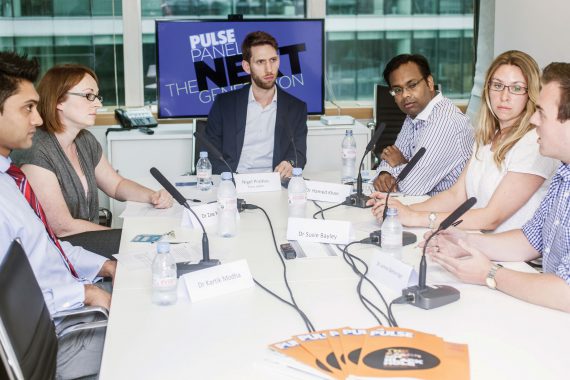
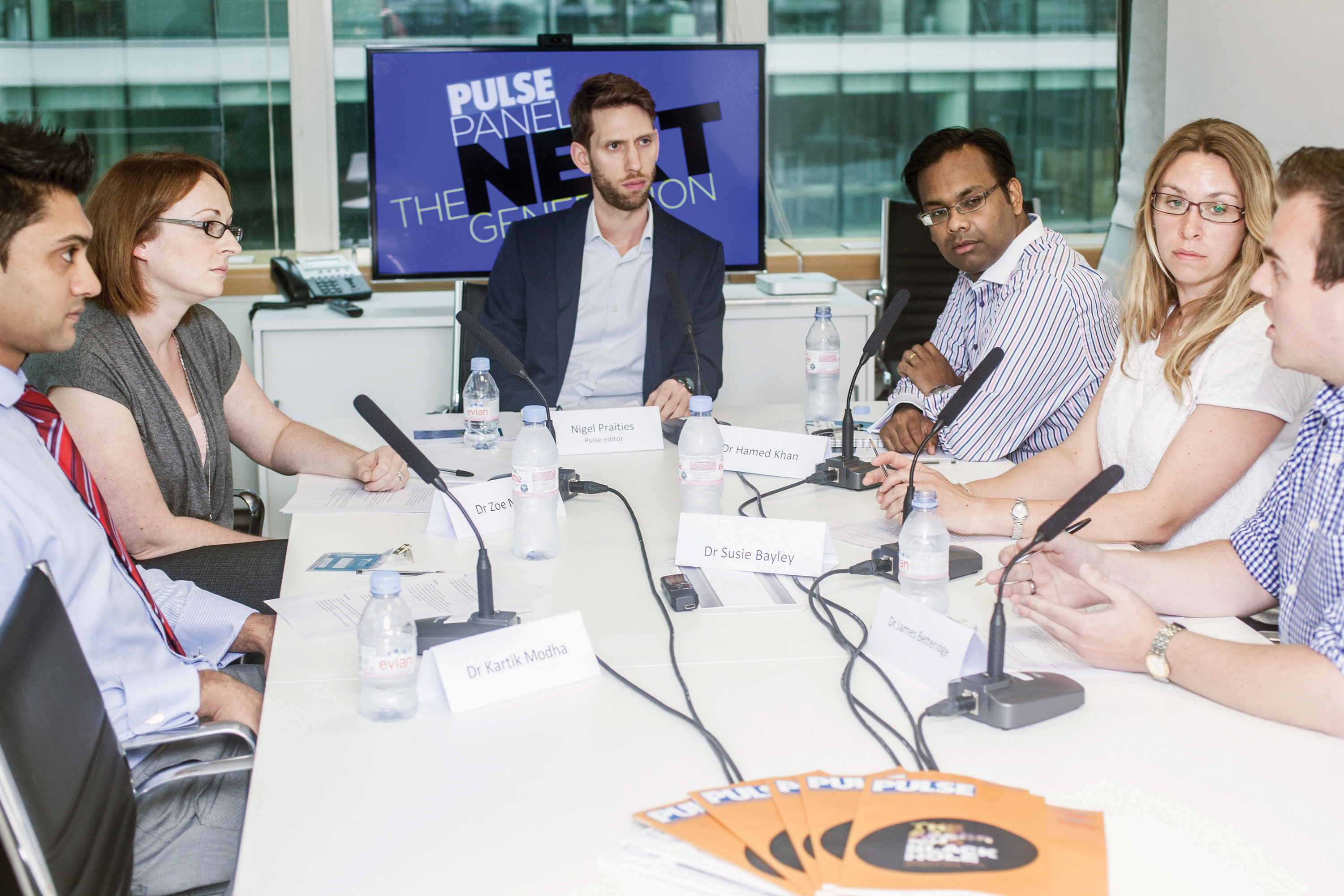
The panel
Nigel Praities (NP) Pulse editor (chair)
Dr Zoe Norris (ZN) Locum GP in Hull, columnist for Pulse and Huffington Post
Dr Hamed Khan (HK) Salaried and A&E GP and clinical lecturer at St George’s, University of London
Dr James Betteridge (JB) GP partner in Derbyshire, CQC clinical adviser and member of Derbyshire LMC
Dr Kartik Modha (KM) Locum GP in London, founder of Tiko’s GP group and myhealthspecialist.com
Dr Susie Bayley (SB) GP partner in Derby and vice-chair of GP Survival Committee
NP – There are many issues facing newly qualified GPs and the impression I get is that many are worried about whether they can sustain a career of full-time medical practice for another 30 to 35 years. Do you think you can?
KM Often GPs are making their careers sustainable through developing portfolio options, building their career around core, general clinical practice and then adding in different things that take their interest and help them evolve as people. I think that’s much more in vogue. Many more people see that to be happy and successful in your career you don’t have to follow the traditional model.
JB I’m very lucky that I’ve got a large number of very supportive partners in my practice who also have different interests. But if I were to lose one of my partners there may well be a requirement for me to scale back on some of that enriching activity. That’s one of our biggest threats. And as a group of younger GPs, we’re not the ones that are going to be retiring in the next five years.
ZN We’re pretty much in the same boat in that, within the next five to 10 years, we could have quite a few partners leaving. [The problem will be] trying to fill those gaps and still do what we want to do.
HK I started off as a partner straight after training, literally the day after I finished my training. I enjoyed it and I found it enriching. It was a steep learning curve, but it became unsustainable from a stimulation and motivation point of view. That motivated me to move to my current career pathway. I think I can sustain it until I retire, but I don’t think I could as a full-time salaried GP or partner.
NP – Has there been a change in younger GPs’ expectation of their careers, or has the job changed?
HK It’s demographics, patient expectations and the culture of litigation that is adding so much pressure. Increasingly we’re having to work in a way that is defensive – and that’s taking a higher priority than it should do, which fundamentally makes the job less fulfilling for all of us.
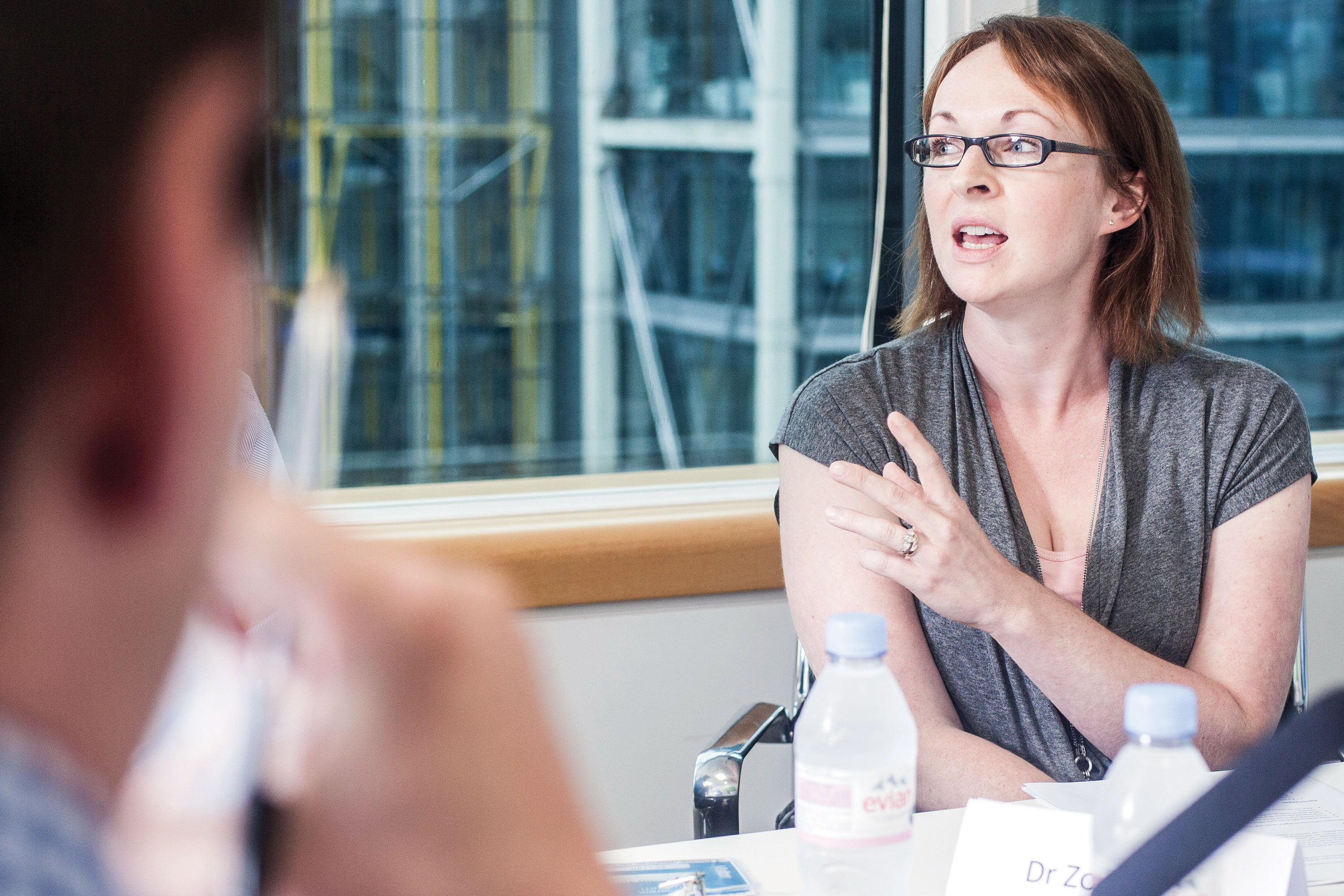
ZN I worked as a salaried GP and then a partner in a particularly demanding practice. Eventually I had to make a choice to change the way I worked or to leave medicine completely. I’m pleased that I decided to stay, but if I can do things outside of direct patient contact that also pay, it gives me a little bit more flexibility and choice. At the moment, practices are one partner away from disaster. If one leaves, everyone is struggling and it’s all hands on deck. You don’t have time to sit and listen to patients because you’re always thinking: ‘I’ve got blood results, I’ve got labs, I’ve got this many phone calls to make.’ If we had enough doctors, we wouldn’t have this.
SB I’ve been in my partnership with the same number of doctors for five years, so it’s been relatively stable. But within that time, the nature of the work has changed. The amount of paperwork, the demand for appointments and the tick-box culture is getting worse. That would make increasing my sessions difficult.
NP – Is it the number of clinical decisions you have to make in a day?
SB It’s increasingly like a conveyor belt. You’re having to make an increasing number of speedy decisions, while keeping at the back of your mind the legal aspects. There isn’t time to sit down and come up with a collective plan. You feel like you are being asked to make a decision on every single case and it’s not always necessary. That expectation has changed dramatically in the time I’ve been qualified.
JB Increasingly we’re being asked to respond to patient want, not patient need. At some point in time there’s got to be some realistic conversations with patients about what we expect primary care to deliver, and more importantly, what it isn’t going to do. Because I think if we try to keep primary care as a catch-all answer to everything we’re going to be on the pathway to disaster.
KM In the MRCGP exam, there’s a lot of focus on communications skills, the hidden agenda, the underlying issues that might have caused a patient’s health problem in the first place. So, we’re given all these brilliant tools through our training. But when you get into clinical practice, all you get is 10 minutes. What we’re asking from GPs is a heck of a lot. At some point we need to recognise we are humans and ask whether we are being fair to our GPs.
ZN Often we can be 20 or 30 minutes behind, but then your next patient wants you to sign a letter for the council to get a parking permit, or something else that is totally inappropriate. This is not the patient’s fault, but that’s not the best use of our very limited resources and energy. Before I became a locum GP, I was getting burned out and I didn’t even want to ask: ‘Have you got any questions?’ at the end of a consultation. I just didn’t have the time and energy if they said: ‘Yes’. It made me want to cry. And it’s horrible to be in that position as we became doctors to try to look after the whole person and to make a difference.
JB That’s part of the recruitment difficulties at present. If you were to go to any hospital in 10 years’ time, I would argue that an orthopaedic surgeon will be doing broadly the same job that they do today. I can’t accurately tell medical students what primary care and the doctor’s role within it will look like in 10 years’ time. Will there be two breeds? Someone who does purely acute and out-of-hours surgery, and somebody doing more chronic care? It’s very difficult to recruit someone to a specialty if you can’t describe to them what their job is going to look like at the end of it.
ZN I’m not sure I’ll have a job in five years’ time. One of the reasons I work the way I do now is because I want to have an option. If primary care suddenly shifts and I don’t do clinical work anymore, I still need to make an income for my family.
NP – In Scotland, they are looking at contractual limits on GP workload as they go as far towards a salaried role as possible. Do you think this is a good idea?
HK As independent contractors, we are seen as a bottomless pit by the Government. [But] I’m not necessarily convinced that problem could be solved by moving to a salaried role and there’s a huge risk that we would give away even the limited control that we have at the moment. The last people I trust with carrying out another reorganisation of primary care is the Government. If it could be more GP led, I would support it. But I doubt very much that it would.
SB It would just be the same, but run in a slightly different way. At the moment we benefit from some aspects of the partnership model and if we try to make it a one-size-fits-all, we will lose more than we gain.
JB If general practice went to a salaried model, the first thing that would happen is loads of GPs would phone in sick. One of the reasons I went into general practice is that I feel I have a sense of ownership for my cohort of patients that can’t be handed over at 6.30pm, in the same way that you would if you were on the shop floor of A&E. This feels more right to me in my relationship with those patients.
SB I think I’m torn with the salaried model, because part of me thinks ‘let’s do it’. Go for it and make us all salaried because we’ll all be phoning in sick. We’ll be taking our annual leave. We’ll be leaving at 5.30pm. Suddenly they’ll realise what we do for our patients. But the patients who’ll suffer from that model are the ones that don’t have a voice, those who are chronically ill or the elderly. They don’t care whether I can Skype them or email, they just want to see me.
ZN It goes back to needs versus wants, doesn’t it?
HK Yes, the key to improving the state of general practice isn’t really coming up with different models. The nub of the problem goes to fundamental re-calibration of patient expectations and a ban on Government interventions.
SB Then we have a model we can sell to incoming students. At the moment, they’ve got nothing to aspire to. We’re all knackered. The Government hasn’t got a clue what it’s doing and there’s no viable career prospect left for them. If everyone knows what they’re doing and has a far better work-life balance, people will want to become GPs again.
KM We need to have a 30-year plan on what we expect as a nation. Then clinicians, patients and politicians will have the same expectations of what we’re trying to achieve.
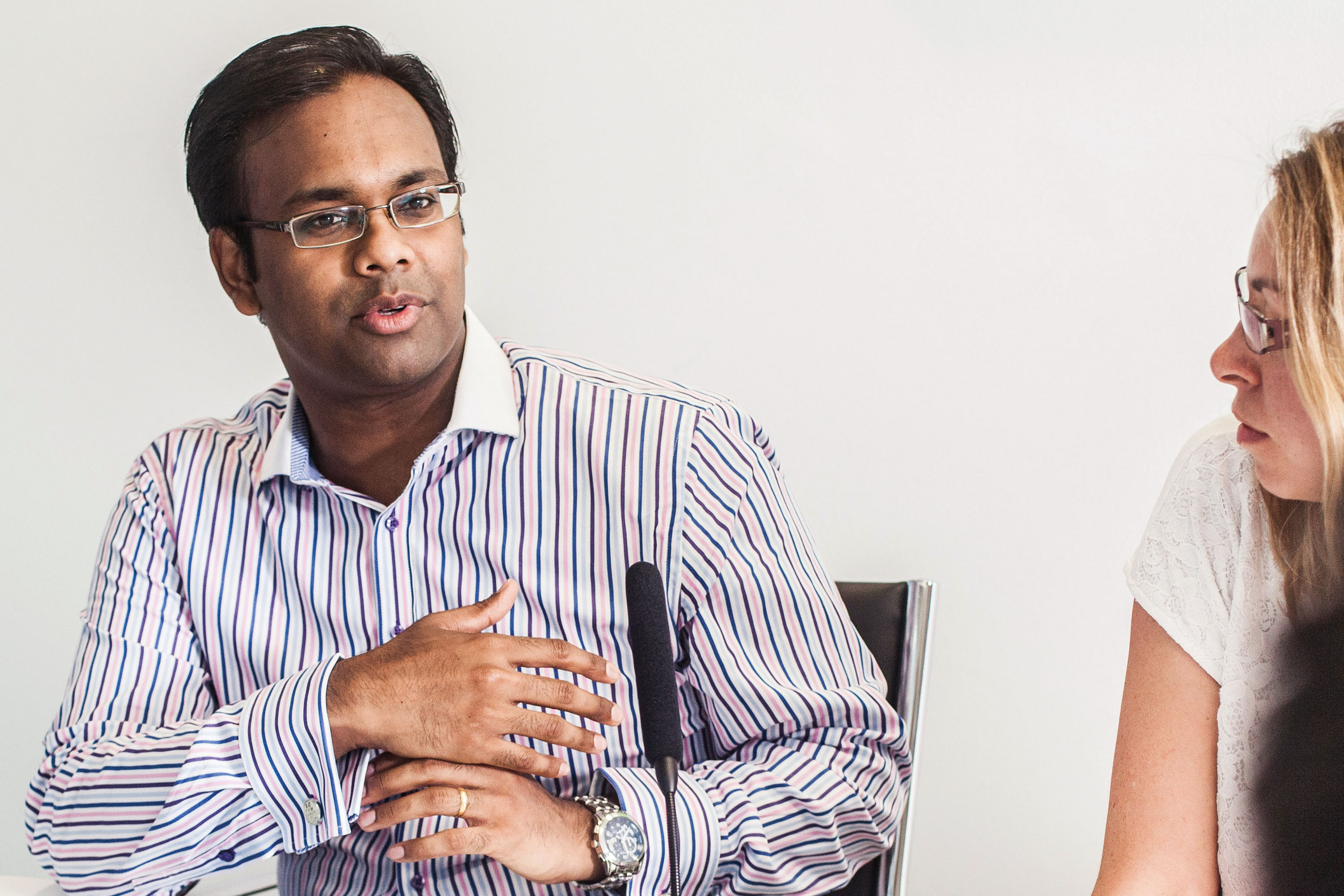
JB I’ve thought for a while that the NHS relationship with the Government ought to be like the Bank of England’s; one step removed. So we have people that are actually in the industry making decisions, rather than MPs that were local councillors only two minutes before they got their first junior minister post.
ZN It’s empowering GPs on the ground to be able to say ‘no’ to inappropriate requests and know that if we then get a complaint, it will be backed by our professional bodies, our medical and legal cover and also the Government. A consistent message that: ‘You may find that the paracetamol you can buy for 12p is no longer available on prescription, because we can’t afford it on the NHS any more.’ As a profession, that would feel amazing.
NP – What do you think about the leadership in the profession itself? As newly qualified GPs, do you feel supported by the BMA and RCGP?
SB I cancelled my BMA membership when Medical Training Application Service came in. I got caught between the systems and felt there was no one speaking for me. I know there is lots of work going on behind the scenes, but I don’t feel there is a loud enough voice from general practice to say ‘no’. It’s only over the last couple of years, with social media, that you have started to see younger people coming through and having a voice, through Tiko’s Group and things like Resilient GP and GP Survival.
JB The RCGP is a very academic force. I’m not going to get that excited about the fact that they’ve developed a new e-learning module on chronic kidney disease when two of our partners have phoned in sick. I cancelled my BMA membership about three or four years ago, around the time of the first strike around pensions. However, on joining the LMC, a lot of what Dr Chaand Nagpaul was saying as head of GPC resonated with what I was experiencing in the practice. This encouraged me to take up my subscription again.
ZN I’m not a member of the RCGP or the BMA. I do feel a bit sorry for the RCGP, because there’s been some frustration with them for not representing GPs. But that’s never what they were intended to do. From the BMA, what I miss is the strength of language. When you look at some other professions they’re really quite strong in the language they use and they’re quite powerful. When health secretary Jeremy Hunt makes announcements about what he’s going to do, we need someone to stand up and say: ‘This is stupid. It’s never going to work.’
SB If Unison or Unite, or the transport unions, were faced with the continual problems that we were getting, someone would just be standing up saying: ‘Enough is enough.’ That voice isn’t there.
NP – Do you feel the younger generation has been sold down the river by the older generation?
HK It’s problematic because younger GPs are a bit like the younger electorate when it comes to general elections. It’s a democratic process and any of us can stand for those positions in the BMA and the RCGP and if elected, can express our views.
ZN Whatever negotiations have gone on in the past, we’ve not been part of them. But I would say that there is movement in the profession now to stand up and say: ‘No. This is not safe, this is not sustainable.’ Older colleagues who are nearer retirement perhaps don’t want to rock the boat or they just want to get their heads down. But they need to either support us, or get out of the way.
NP – How much of a shock is it when you start practising as a GP after training?
KM It was a big shock for me.
SB It depends on your trainer. Mine was very clear that I needed to be up to 10-minute appointments well in advance of the CSA. I went into a salaried role with a BMA model contract at a nice practice with enough GPs. Although I wasn’t particularly well supported, the clinical work was straightforward.
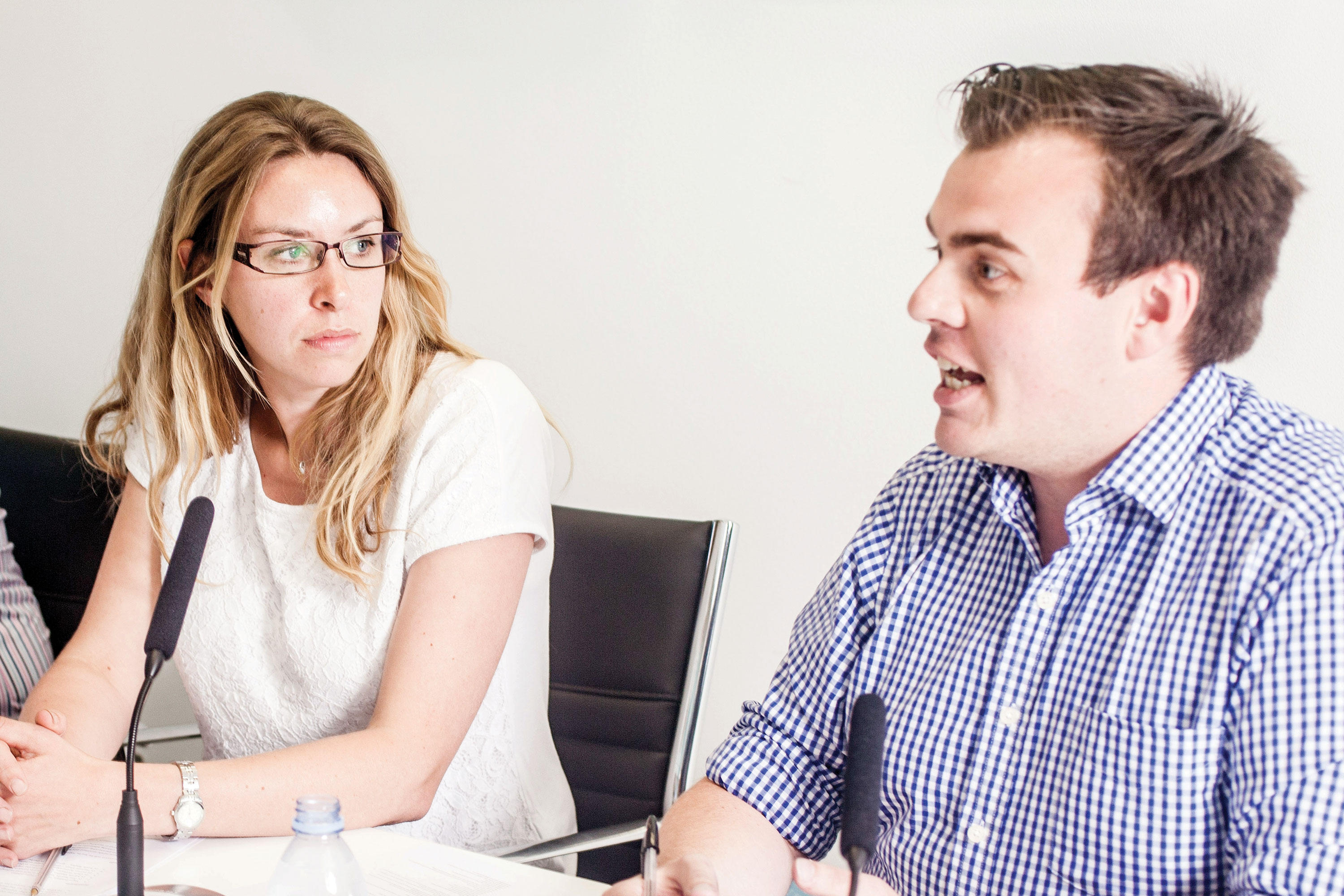
JB I had a fairly easy transition to partnership, compared with most of my colleagues, with a six-month run-in. But some have already resigned or gone abroad, just 12 months after starting a salaried post.
SB It depends on your VTS cohort. We were all keen to go into partnerships so we wanted to learn about all the aspects of general practice that would make us a GP, not just make us somebody who’s got an MRCGP. But recently a lot of the focus seems to be on the exams. And, that’s not right, because it’s just one part of it. If you think about when we went from being medical students to being house officers or foundation doctors, we had a week to learn what it was to be a house officer. If you had that sort of transition from being a GPST to being a GP, it would help.
KM The great thing about the group I run on Facebook, and about Resilient GP and GP Survival, is that it is about creating these support networks online. We learn from each other, and having that supportive structure is important to grow into veteran GPs at an earlier stage. Otherwise it will eat you up and you will go abroad or drop out.
JB In my practice, we are a group of like-minded individuals who religiously meet at 10.30am for a coffee break. It brings that sense of community back, which is necessary. I’ve never worked as a locum or freelance GP, but I think one of the most difficult things about those roles is not having that consistent support network of peers.
ZN I worked in a salaried role in a practice that didn’t have an ‘open door’ policy and I was very isolated in that role. Now I work as a locum through chambers and I get better support than I ever did in a salaried role. I can text, I can email, I can go on to our online forum and we have monthly CPD meetings. There is a group of like-minded GPs. In the area I work, the chambers group has the monopoly on locums in the area. So we are able to pick and choose, pretty much, the practices that we work at and the projects we’re involved with.
NP – Obviously at the moment there is a shortage of GPs and there’s a lot of talk about using other healthcare workers, such as physician associates and pharmacists. Is this just a cheaper way to provide care?
KM If my mother or father went in to see a GP and they didn’t see a qualified GP, I would feel shortchanged. There is something absolutely fundamental about what we do in terms of pulling all the strings of clinical medicine, the social context, and extracting that out with a good communication. You can’t impart that on a short training scheme.
HK In my academic role, I work with people who train physician associates and I have great respect for them. But they’re not training to be GPs. It’s not just being shortchanged – it’s a real risk to patient safety.
SB The lack of transparency is shocking. General practice is incredibly difficult to do well. Five years in, I’m still learning. There are excellent allied professions doing brilliant jobs, but we have to be clear what their role and remit is and that they’re not a substitute for GPs.
JB Certainly, in my practice, I think we operate more efficiently and safely for having two excellent advanced nurse practitioners who prescribe and help deal with most of our same-day demands. But what about the patient that presents to three different healthcare professionals in an acute setting with the same cough? Who is thinking this could be the first presentation of cancer? Who’s looking at the presentation of a bit of back pain, stomach pain and low-level depression, and drawing it all together as anxiety, rather than referring them for every investigation under the sun?
NP – It’s interesting that none of you have mentioned pay. Is that not a motivator?
JB I spent the last week handing out food vouchers to people. We spend our days being told about people who are struggling. I cannot moan about the level of renumeration I have when these are the people I’m dealing with day to day.
ZN None of us went into medicine to be multi-millionaires and if we did we picked the wrong career. But you want to pay off your student loan, get rid of your credit card and pay your mortgage.
SB Most of our issues about pay are that it’s incredibly over-inflated in the press and nowhere near what is reported. I know I’m paid well compared to the average person on the street, and I’m not paid well compared with someone with my qualifications and level of experience. But if I get my work-life balance sorted, I would be more than happy.
HK Speaking to my students, pay is never a primary motivational factor. Our main motivation is providing good care and finding fulfilment in what we do. I don’t think a pay increase of 10% or whatever will necessarily increase GP recruitment. It certainly won’t increase the incentive for the students I teach. But we hate being misrepresented. The figure that’s portrayed in the media is so different from what we take home and that figure often drives patient expectations.
ZN That hits my personal morale more than anything. I’ve had patients question my earnings in consultations and it really upsets me. Not the fact that they are questioning, but that people don’t seem to think I do anything that is worth what they think I earn. I want to be judged on the difference I make, not what you think I earn. I should harden up, I know.









